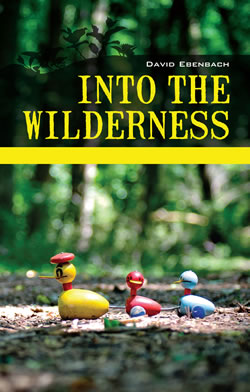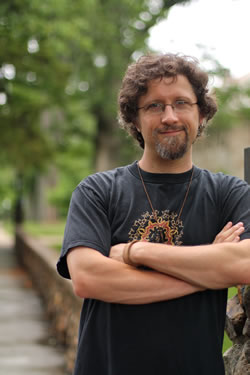|
One thing I'm discovering about myself as a writer of fiction is that I seem to be a short-story guy rather than a novel guy. There are lots of folks who write both, of course, and it's possible that someday I'll be one of them, but so far it's been all about the short story. I love reading stories, and I love writing them; there's something about the form that I find intensely satisfying and powerful. And I'm using the word "form" intentionally. Another thing I've discovered is that a short story is not just a mini version of a novel, that in fact they're totally different forms of writing—and that a preference for one over the other might have to do with what they say about the world.
What the novel says, I think, is that any single event is the result of many, many things. That's why you have the hundreds of pages leading up to the climax; those pages suggest the philosophy that you can only fully understand that climax and its significance if you know a whole lot about all the things that led up to it—the struggle, the background information, the character's experiences and thoughts. And indeed that philosophy holds water. Think of your favorite novel, and imagine only reading the last five percent of the book. You'd certainly feel like you were missing something.
The short story says something different—not contradictory, but different. The short story suggests that any single moment or detail, in some sense, contains everything: the characters; their problems and promise; the significance of the events; human nature, more generally; the past, the present, and the future. And this holds water, too. If any moment, any action, any consequence, any object in a character's life is the result of many, many things, then it must be true that those things are present, at least by implication, in the moment itself. They've left their fingerprints all over it. Furthermore, each moment is part of an ongoing trajectory and so also contains an idea of things to come.
Like I say, this doesn't contradict what the novel tells us; these are complementary ideas, a matter of emphasis. But I think it explains why I'm turning out to be a short-story guy. I think small things are enormous, and I always have; it's part of my personality, and it shows in my writing. The author Suzanne Greenberg once wrote this about my first collection of fiction, Between Camelots: "Each moment seems capable of changing everything." This seems to be my consistent worldview. Author Jesse Lee Kercheval had this to say about Into the Wilderness, my current collection of short fiction, which is about parenting: "One single moment, the birth of a child, changes everything." And think about that one: if that event of childbirth doesn't change everything, somebody's not paying attention.
For me, though, this extends to more mundane moments and details, as well. My short story "Nobody Loves a Snowy Girl" was born entirely out of hearing a little girl say those few words; in "Hungry to Eat," the fact that the light bulb is burned out in the protagonist's garage says an awful lot about him; when the two characters in "Naming" have a very brief and ordinary encounter with a kid in a pet store, it sends them in a whole new direction; the protagonist of "Life Is the Fruit" understands something enormous and crucial after a tiny pause in a conversation.
What this means, of course, is that if you're going to write a short story, you have to care about the tiny things. Would your character really wear turquoise shoes? When she takes her partner's hand, how tightly does she hold it, and for how long? What exactly does the neighbor's dog's bark sound like? What does your character do with his coat when he takes it off? What words does he use to greet his parents when they arrive for a visit—and are those parents late, early, or on time? All of this matters a lot.
I know—it's a lot to think about. But I'm not talking about making countless things up, making a zillion little, arbitrary decisions. I'm talking about actually caring about the details, actually believing—as I do, and as I think the typical short-story writer does—believing that each detail contains the world. And it means showing your readers that it's true.

|



